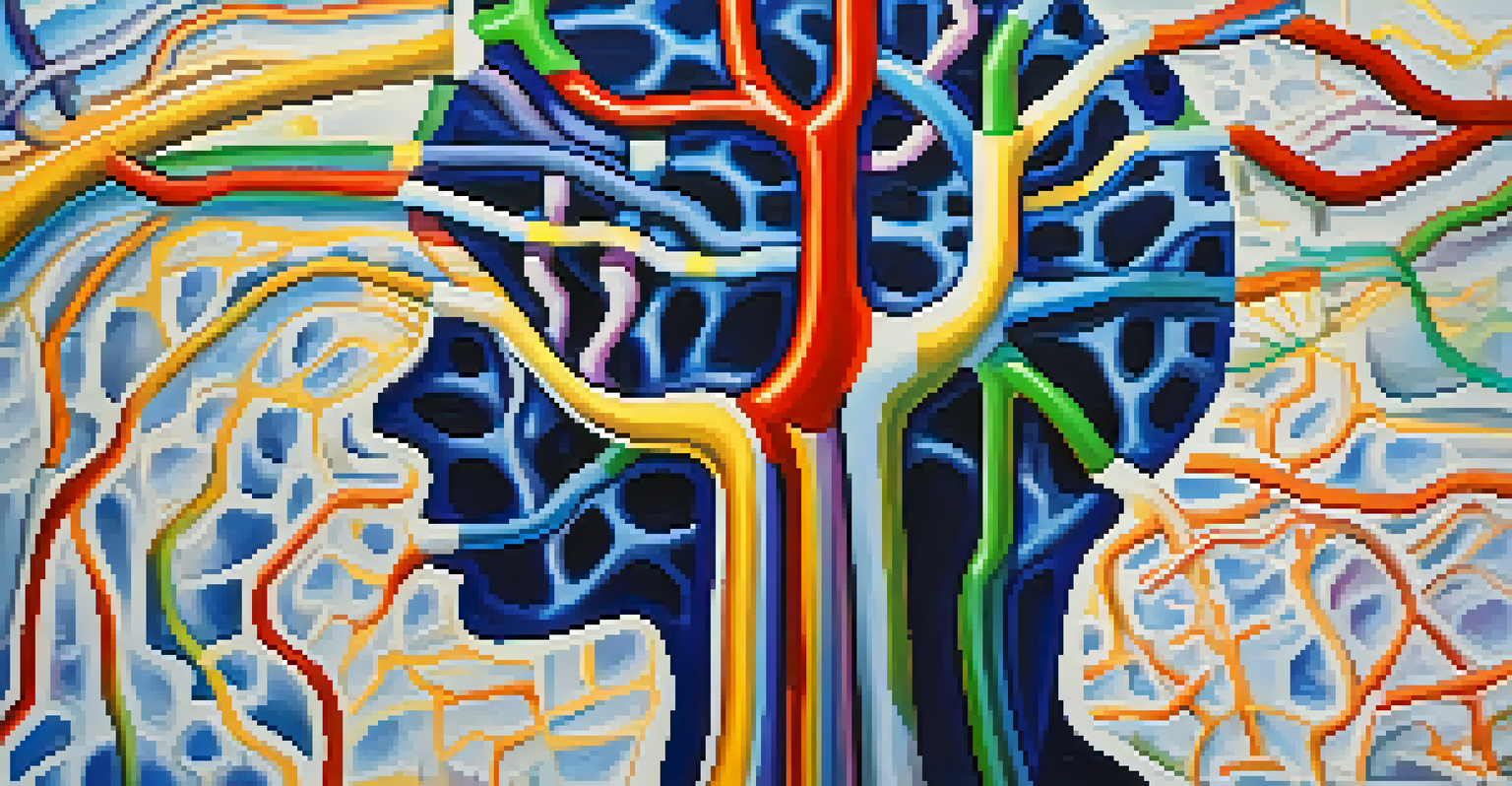Entheogens and Consciousness: DMN Activation Explained

What Are Entheogens and Their Role in Consciousness?
Entheogens are substances that can induce altered states of consciousness, often used in spiritual or religious contexts. They can range from plant-based substances like ayahuasca to synthetic compounds like LSD. These experiences can lead to deep insights and a heightened sense of connection with oneself and the universe.
The greatest discovery of my generation is that a human being can alter his life by altering his attitude.
Many cultures have historically utilized entheogens in rituals, seeking to explore the nature of reality and consciousness. The effects can vary widely, from euphoria to intense introspection, and this variability makes them a fascinating topic of study.
In recent years, scientific research has begun to uncover the mechanics behind these experiences, particularly how they affect brain function and consciousness. Understanding this relationship can shed light on the potential therapeutic benefits of entheogens in treating mental health issues.
Understanding the Default Mode Network (DMN)
The Default Mode Network (DMN) is a network of brain regions that is active when we are not focused on the external environment, often engaging in daydreaming, recalling memories, or thinking about the future. It’s like the brain’s idle state, where it processes internal thoughts. When the DMN is active, it can lead to a sense of self-referential thought, which is crucial in shaping our identity.

Research has shown that the DMN is linked to various cognitive functions, including self-awareness and the construction of narratives about our lives. However, overactivity in this network can sometimes contribute to conditions like anxiety and depression. Therefore, understanding the DMN's role is vital for both neuroscience and psychology.
Entheogens Alter Consciousness
Entheogens induce altered states of consciousness, often leading to profound personal insights and connections.
Interestingly, entheogens have been found to affect the DMN significantly, often reducing its activity. This reduction can lead to a feeling of ego dissolution, where individuals experience a sense of oneness with the universe, stripping away the barriers of their personal identity.
How Do Entheogens Influence DMN Activity?
Entheogens appear to modulate DMN activity in ways that facilitate altered states of consciousness. When these substances are consumed, brain imaging studies often reveal decreased connectivity within the DMN, which correlates with reduced self-referential thinking. Essentially, the brain shifts from a state of rigid self-focus to a more interconnected mode.
Psychedelics can help us see the world differently, open our hearts, and connect us to the universe.
This shift can result in profound experiences that many describe as mystical or transcendent. For instance, individuals may feel a deep sense of connection with nature or the universe, which can lead to lasting changes in perception and emotional well-being. The ability of entheogens to disrupt habitual thought patterns opens up new avenues for understanding consciousness.
Moreover, the potential therapeutic implications of these findings are immense. By altering DMN activity, entheogens may provide relief for individuals struggling with mental health disorders, allowing them to break free from the cycles of negative thought.
The Therapeutic Potential of Entheogens
Research into the therapeutic potential of entheogens has surged in recent years, especially for conditions like PTSD, depression, and anxiety. Clinical trials suggest that, when used under controlled conditions, entheogens can lead to significant improvements in mental health. These substances help patients confront and process trauma, often resulting in a sense of clarity and emotional release.
The way entheogens interact with the DMN seems to play a crucial role in these therapeutic outcomes. By disrupting negative thought patterns, they allow individuals to gain a new perspective on their experiences and emotions. This shift can facilitate healing, making way for a more integrated sense of self.
DMN's Role in Self-Perception
The Default Mode Network (DMN) influences self-referential thinking, which is significantly affected by entheogens.
While promising, it’s essential to approach the use of entheogens with caution. Proper guidance and support are crucial to ensure these experiences are safe and beneficial, highlighting the importance of ongoing research and clinical trials.
Experiential Insights from Entheogen Use
Many individuals who have used entheogens describe their experiences as life-changing. They often report a heightened sense of interconnectedness, empathy, and understanding, which can deeply influence how they perceive themselves and others. These insights can lead to lasting changes in behavior and outlook.
For instance, a person might emerge from an experience with a new appreciation for life, feeling more connected to the world around them. This newfound perspective can foster compassion and reduce feelings of isolation, which are often at the core of many mental health conditions.
However, these experiences can also be challenging. Some individuals may confront difficult emotions or memories during their journey, which is an integral part of the healing process. This duality highlights the complexity of entheogens and their impact on consciousness.
Cultural Perspectives on Entheogens and Consciousness
Different cultures have long recognized the potential of entheogens for expanding consciousness. In many Indigenous traditions, these substances are considered sacred tools for healing and spiritual connection. For example, the use of peyote in Native American rituals illustrates how these substances are integrated into community and spiritual practices.
As Western society increasingly explores these practices, there is a growing recognition of the wisdom embedded in these traditions. By understanding various cultural perspectives, we can appreciate the diverse ways in which entheogens have been used to connect with consciousness throughout history.
Therapeutic Promise of Entheogens
Research suggests that entheogens may offer therapeutic benefits for mental health conditions by disrupting negative thought patterns.
This cultural lens also emphasizes the importance of respecting these practices and the communities that have cultivated them. As research continues to evolve, ensuring that cultural integrity is maintained will be vital in promoting ethical and respectful use of entheogens.
Future Directions in Entheogen Research
The field of entheogen research is rapidly evolving, with numerous studies underway to explore their effects on consciousness and mental health. As more researchers delve into the science behind these experiences, we can expect to uncover new insights into how they interact with the DMN and other brain networks. This research could potentially revolutionize our understanding of consciousness itself.
Moreover, as societal attitudes toward entheogens shift, there’s a growing push for policy changes that would allow for more widespread research and therapeutic use. This could pave the way for innovative treatment options for mental health disorders, offering hope to those who have struggled with conventional therapies.

Looking ahead, it’s essential to continue fostering a dialogue between scientific and cultural perspectives. By integrating various viewpoints, we can develop a more comprehensive understanding of the role of entheogens in human consciousness and well-being.